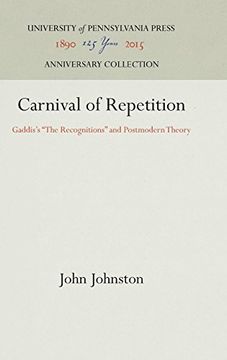Share
Carnival of Repetition: Gaddis's "Recognitions" and Postmodern Theory (Penn Studies in Contemporary American Fiction)
John Johnston (Author)
·
University Of Pennsylvania Press
· Hardcover
Carnival of Repetition: Gaddis's "Recognitions" and Postmodern Theory (Penn Studies in Contemporary American Fiction) - John Johnston
Choose the list to add your product or create one New List
✓ Product added successfully to the Wishlist.
Go to My Wishlists
Origin: U.S.A.
(Import costs included in the price)
It will be shipped from our warehouse between
Wednesday, June 26 and
Friday, July 12.
You will receive it anywhere in United Kingdom between 1 and 3 business days after shipment.
Synopsis "Carnival of Repetition: Gaddis's "Recognitions" and Postmodern Theory (Penn Studies in Contemporary American Fiction)"
Although published many decades ago, William Gaddis's The Recognitions is only now beginning to receive the critical attention it deserves. Carnival of Repetition, the first full-length study of the novel, is a sophisticated analysis that places it in a new literary and cultural context . This novel of the 1950 s is unlike anything else from that decade. It harks back to the works of high modernism (exemplified by Joyce's Ulysses) and looks forward to postmodern fiction (especially as practiced by Barth, Pynchon, and DeLillo). Imitation is its major theme, one that Gaddis pursues on many levels, across several continents, into mazes of arcane knowledge and bogus scholarship, and even into the novel's structure through the repetition of prior texts and the interplay between literal and disguised quotation. Through an endless play of repetition, Gaddis con-founds the reader's recognition of similarity and difference. Johnston uses the theories of Bakhtin and Deleuze (and others, such as Julia Kristeva) to map out a context for this most unusual and difficult work. From Bakhtin, he appropriates the concepts of "carnivalesque" fiction and dialogism (or a plurality of independent voices, no one more important than another). From Deleuze, he borrows the idea of the simulacrum, a copy that presupposes no original and that becomes meaningful through a process of infinite repetition. With these instruments, Johnston analyzes the labyrinth of copy and counterfeit that Gaddis constructs in his novel.
- 0% (0)
- 0% (0)
- 0% (0)
- 0% (0)
- 0% (0)
All books in our catalog are Original.
The book is written in English.
The binding of this edition is Hardcover.
✓ Producto agregado correctamente al carro, Ir a Pagar.

